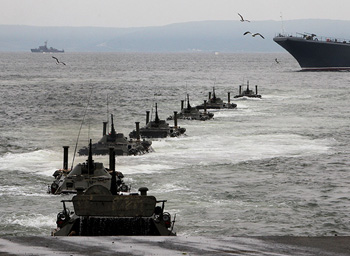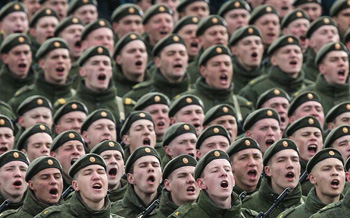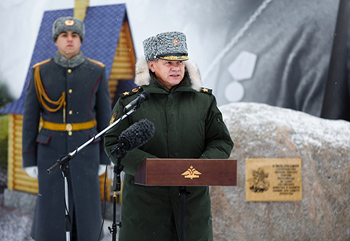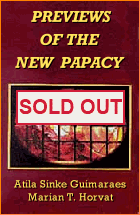International Affairs
 |
 |
 |
 |
 |
 |
 |
Russia Gloats as America Weakens
The Russian press is gloating over the decline of U.S. naval power and the growing strength of Russian naval forces in the Pacific.
In an article on the Russian news site RIA Novosti, an official organ of the Russian government, Pacific Fleet Admiral Gary Harris is quoted as expressing “worry” regarding the “rapid pace” of modernization of Russian naval bases and the construction of nuclear submarines.
 RIA Novosti based its information on an article on the Foreign Policy website, which reported recent remarks of Admiral Harris to the House Armed Services Committee. While Foreign Policy related Admiral Harris' concerns about both Russian and Chinese naval expansion, including the attempted annexation of most of the South China Sea, RIA Novosti emphasized Russia's growing naval rivalry with the United States, citing the decline of U.S. naval capabilities and the growth of the Russian submarine forces. RIA Novosti referred to the observation by Admiral Harris that “Russia's submarine fleet is second only to the American navy.”
RIA Novosti based its information on an article on the Foreign Policy website, which reported recent remarks of Admiral Harris to the House Armed Services Committee. While Foreign Policy related Admiral Harris' concerns about both Russian and Chinese naval expansion, including the attempted annexation of most of the South China Sea, RIA Novosti emphasized Russia's growing naval rivalry with the United States, citing the decline of U.S. naval capabilities and the growth of the Russian submarine forces. RIA Novosti referred to the observation by Admiral Harris that “Russia's submarine fleet is second only to the American navy.”
RIA Novosti's reporting reveals not only a pride in the growth of Russian navy, but also gives an indication of Moscow's ongoing effort to build enthusiasm for its armed forces after the collapse of the Soviet Union. The not so subtle message is that Russia again is able to challenge the United States.
Russian military might - a popular theme in Russia.
In a recent poll conducted by Russia's leading (and State-run) polling agency, the Russian Public Opinion Center (VTsIOM), the support for the Russian military is rapidly growing, as is the fear of a threat from “foreign nations.”
 The poll stated that 69% of Russians see a foreign threat to Russia, up from 52% in 2014 and 37% in 2009. A “strong army” is favored by 88%. In a separate report on the same poll, the percent of Russians believing that there is a threat of war against Russia from “other nations” has risen from 56% in 2014 to 65% in the current polling. While not formally calling the United States an “enemy,” the Russian government identifies America as a “threat.”
The poll stated that 69% of Russians see a foreign threat to Russia, up from 52% in 2014 and 37% in 2009. A “strong army” is favored by 88%. In a separate report on the same poll, the percent of Russians believing that there is a threat of war against Russia from “other nations” has risen from 56% in 2014 to 65% in the current polling. While not formally calling the United States an “enemy,” the Russian government identifies America as a “threat.”
In discussing Russia's most recent defense strategy, published in January of this year, the chairwoman of the security committee in the Duma, Russia's lower legislative chamber, stated that Russia “objectively assess American political policies ... [as] dangerous for Europe, Russia, and the entire world.”
In other words, the Russian political establishment resents American interference (as limited as it is) in Ukraine and the Baltic nations.
At the same time, Russia is supplying nuclear technology to the Islamic Republic of Iran (along with the missile systems to protect Iran's nuclear installations); Russian troops are present in Ukraine supporting separatist rebels (who appear to be pro-Stalinist); and Russian armed forces threaten the smaller nations of Latvia, Lithuania, and Estonia.
While American “interference” is condemned, Russian bombers fly into Cuba and Nicaragua, and Moscow projects that it will develop naval stations at various locations in Latin America.
Russia has also redeveloped old Soviet bases in the Arctic and further expanded upon the former Soviet presence at the top of the world. The Peoples Republic of China has joined Russia in the Arctic, just as Russia is supporting China in its aggressive claims in the western Pacific.
Partisan Village: celebration of the Stalinist past
The Russian people are being groomed to support a militaristic State with a growing communist ideology.
Moscow is attempting to connect seamlessly the Soviet past with present day Russia. One recent example is recounted in a RIA Novosti article on the opening of the “Partisan Village” located near Moscow.
 While a chapel is to be built on the premises, the emphasis of the “historical and memorial complex” is centered on Soviet para-military forces which fought against invading Nazi armies, often behind the lines. The Russian Defense Minister, General Sergei Shoigu, stated at the opening of “Partisan Village” that the visitors can “immerse themselves in the life of the Soviet underground of the Great Patriotic War.”
While a chapel is to be built on the premises, the emphasis of the “historical and memorial complex” is centered on Soviet para-military forces which fought against invading Nazi armies, often behind the lines. The Russian Defense Minister, General Sergei Shoigu, stated at the opening of “Partisan Village” that the visitors can “immerse themselves in the life of the Soviet underground of the Great Patriotic War.”
The “Partisan Village” fits neatly into Moscow's rehabilitation of Stalin, who lead the Soviet Union during World War II, although Stalin was an ally of German dictator Adolf Hitler until the surprise Nazi assault on June 22, 1941. Stalin is portrayed as the hero who saved the Soviet Union, notwithstanding his mass murder of some 20 million, which is discounted by present Russian leaders as a mistake or an excess.
All things Soviet are in the process of being rehabilitated, and Russian politicians now speculate as to “why” the Soviet Union collapsed, while the USSR's crimes against humanity are forgotten.
The process of bringing some form of a new Soviet State into existence is ongoing and has been in progress since the collapse of the USSR. Vladimir Putin and company are aligned with the Peoples Republic of China, other Communist States, and Islamic terrorism as it fits their purpose. Whoever is the next U.S. President, that individual will face the daunting task of confronting this very dangerous political and military reality. The first step will be to bring U.S. defenses to the point where they can adequately deal with an increasingly militaristic and Communist Russia along with the aggressive Peoples Republic of China.
It is a task requiring an individual who recognizes our perilous situation but who remains determined but steady, a true patriot without bombast. May God guide us in this election year.

Toby Westerman publishes
International News Analysis - Today
An uncompromising weekly analysis of the world situation
Contact T. Westerman at
www.inatoday.com
or P.O. BOX 5182, Rockford, ILL, 61125-0182
In an article on the Russian news site RIA Novosti, an official organ of the Russian government, Pacific Fleet Admiral Gary Harris is quoted as expressing “worry” regarding the “rapid pace” of modernization of Russian naval bases and the construction of nuclear submarines.

Amphibious assault operation of Russia's Pacific Fleet for Russian Navy Day celebrations
RIA Novosti's reporting reveals not only a pride in the growth of Russian navy, but also gives an indication of Moscow's ongoing effort to build enthusiasm for its armed forces after the collapse of the Soviet Union. The not so subtle message is that Russia again is able to challenge the United States.
Russian military might - a popular theme in Russia.
In a recent poll conducted by Russia's leading (and State-run) polling agency, the Russian Public Opinion Center (VTsIOM), the support for the Russian military is rapidly growing, as is the fear of a threat from “foreign nations.”

As Russian leaders build enthusiasm in their soldiers, U.S. government demoralizes its military forces
In discussing Russia's most recent defense strategy, published in January of this year, the chairwoman of the security committee in the Duma, Russia's lower legislative chamber, stated that Russia “objectively assess American political policies ... [as] dangerous for Europe, Russia, and the entire world.”
In other words, the Russian political establishment resents American interference (as limited as it is) in Ukraine and the Baltic nations.
At the same time, Russia is supplying nuclear technology to the Islamic Republic of Iran (along with the missile systems to protect Iran's nuclear installations); Russian troops are present in Ukraine supporting separatist rebels (who appear to be pro-Stalinist); and Russian armed forces threaten the smaller nations of Latvia, Lithuania, and Estonia.
While American “interference” is condemned, Russian bombers fly into Cuba and Nicaragua, and Moscow projects that it will develop naval stations at various locations in Latin America.
Russia has also redeveloped old Soviet bases in the Arctic and further expanded upon the former Soviet presence at the top of the world. The Peoples Republic of China has joined Russia in the Arctic, just as Russia is supporting China in its aggressive claims in the western Pacific.
Partisan Village: celebration of the Stalinist past
The Russian people are being groomed to support a militaristic State with a growing communist ideology.
Moscow is attempting to connect seamlessly the Soviet past with present day Russia. One recent example is recounted in a RIA Novosti article on the opening of the “Partisan Village” located near Moscow.

Defense Minister Shoigu at the opening of the Partisan village in Patriot Park
The “Partisan Village” fits neatly into Moscow's rehabilitation of Stalin, who lead the Soviet Union during World War II, although Stalin was an ally of German dictator Adolf Hitler until the surprise Nazi assault on June 22, 1941. Stalin is portrayed as the hero who saved the Soviet Union, notwithstanding his mass murder of some 20 million, which is discounted by present Russian leaders as a mistake or an excess.
All things Soviet are in the process of being rehabilitated, and Russian politicians now speculate as to “why” the Soviet Union collapsed, while the USSR's crimes against humanity are forgotten.
The process of bringing some form of a new Soviet State into existence is ongoing and has been in progress since the collapse of the USSR. Vladimir Putin and company are aligned with the Peoples Republic of China, other Communist States, and Islamic terrorism as it fits their purpose. Whoever is the next U.S. President, that individual will face the daunting task of confronting this very dangerous political and military reality. The first step will be to bring U.S. defenses to the point where they can adequately deal with an increasingly militaristic and Communist Russia along with the aggressive Peoples Republic of China.
It is a task requiring an individual who recognizes our perilous situation but who remains determined but steady, a true patriot without bombast. May God guide us in this election year.

Posted March 2, 2016
International News Analysis - Today
An uncompromising weekly analysis of the world situation
Contact T. Westerman at
www.inatoday.com
or P.O. BOX 5182, Rockford, ILL, 61125-0182
______________________
______________________
 Volume I |
 Volume II |
 Volume III |
 Volume IV |
 Volume V |
 Volume VI |
 Volume VII |
 Volume VIII |
 Volume IX |
 Volume XI |
 Special Edition |
 Special Edition |


